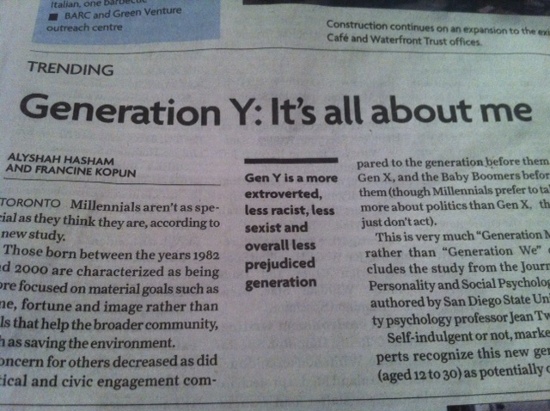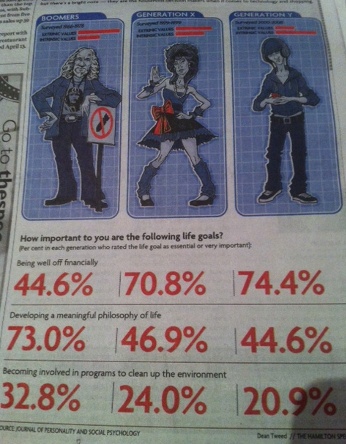The Hamilton Spectator carried the headline today, ‘Generation Y: It’s All About Me’. The article commented on a study in the Journal of Personality and Social Psychology, co-authored by San Diego State University psychology professor Jean Twenge, on Generation Y, also known as the Millennials, and now Generation Me.

They said and I quote,
“Millennials aren’t as special as they think they are, according to a new study.
Those born between the years 1982 and 2000 are characterized as being more focused on material goods such as fame, fortune and image rather than goals that help the broader community, such as saving the environment.”
It goes on to say that although Generation Y, might talk more about politics, than my generation, Generation X, they don’t act. They are very much a Generation Me, than a Generation We.
This got me thinking about some of my comments in my recent post on the St. Patrick’s Day riots in London, Ontario. About how strongly I feel about teaching youth to be positive members of society, that work hard and think about others. While there are certainly members of that generation that are exceptionally hard workers and empathetic citizens, like Alyzee (who writes here from time to time), I have seen these stereotypes first hand with others. I have observed friend’s classes in post-secondary institutions, and seen a generation that is disrespectful of their teachers, treating the teacher and institution as though they work for them. They think they should be able to pick and choose what work they feel like doing, and that they should not be penalized for not completing it in full. That same attitude is creeping into the workforce, where the young people think they know better than the boss and aren’t afraid to tell them such. When told the quality of their work needs improving or are given notes on improvements they can make to their work, I’ve seen full grown temper tantrums and series of childish texts and unprofessional emails. These are all of course stereotypes of the generation as a whole, but stereotypes that are increasingly being witnessed by friends and colleagues across the country.

So why then does the article go on to suggest,
“Self-indulgent or not, marketing experts recognize this generation, as potentially one of the most powerful ever.”
I think the key words in this sentence are ‘marketing experts’ and the fact that later in the article it talks about how these kids influence their parents to buy.

I question whether those marketing experts are confusing the impact of social media with that generation (when the leaders and influencers in that space, are generally those in Generation X) or if it is simply that they are bigger spenders. If it’s the latter, then where are they getting their money? If it’s from their parents, then doesn’t there come a point when the parents must cut the purse strings? Will the spending be sustainable once the parents or student’s loans aren’t bankrolling the deep pockets?
Would love your opinions on this. Do this stereotypes play true? How long can society sustain a Generation Me? Do we continue to make the same mistakes with the next generation? If something doesn’t change, what will the next generation in this illustration from the Journal of Personality and Social Psychology look like?






Psy says
Makes me wonder where we are heading to… Great article! The ideas herein are really insightful. I look forward to reading more articles from you.